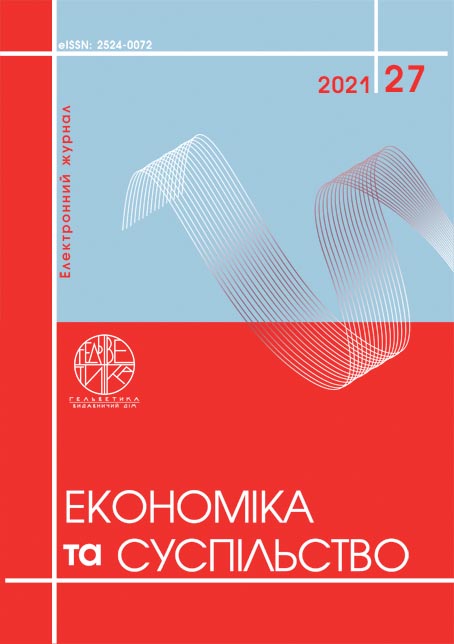ORGANIZATION AND RATING OF WORK ACCORDING TO THE PRINCIPLES OF SOCIO-ECONOMIC SAFETY AT FOOD INDUSTRY ENTERPRISES
Abstract
The actuality of research’s improvement of organization and set of labour norms taking into account principles of socio-economic safety is established in the article. The increase of organization efficiency and set of labour norms of food industry enterprises, the estimation influences on the qualities of operating norms, that must take into account all factors and risks of food productions by the modern standards of personnel safety is proven in the article. Socio-economic safety of the enterprise respect the person’s interests, necessities and his/ her safety in the sphere of labour. The personnel as the basic value of the enterprise must work in safe normal terms and with the high labour productivity. The influence of socio-economic safety through the component of technical and economical safety on labour organization and its constituent of set of labour norms is offered in the article. The classification of threats of technological and technical safety of the enterprise with dividing them into external and internal is generalized. The modern structure of technical and technological safety by the constituents, in particular, the state and level of technical and technological base of the enterprise, productive safety, labour safety, technician safety protection, control system of health protection and labour safety is worked out. The best enterprises of food industry are certificated by the standards of ISO 9001 “System of management quality”, ISO 22000 “System of management safety of food products” and ISO 45001 “Control system of health protection and labour safety”, that fully answers the requirements of technical and technological safety, organization and set of labour norms. Especially popular distribution of introduction standard experience of ISO 45001 as the most modern world requirements to the health protection and labour safety in obedience to International Labour Organization. The negative tendencies in organization and set of labour norms of food industry enterprises of present time are analyzed. The events in relation to the improvement of organization and set of labour norms on the food industry enterprises, taking into account the principles of socio-economic safety and international experience in accordance with standards, positions and rules of International Labour Organization are offered.
References
Арапов О.С., Дорошенко Т.М. Нормування праці як фактор підвищення ефективності виробництва. Економічний аналіз. 2017. Т. 27, № 4. С. 188–195.
Бутенко Д.С. Теорія управління персоналом на засадах нормування праці та дослідженні витрат робочого часу. Молодий вчений. 2019. № 1(2). С. 433–437. URL: http://nbuv.gov.ua/UJRN/molv_2019_1(2)__44
Водянка Л.Д., Зрибнєва І.П., Сибирка Л.А. Особливості нормування праці в сучасних кризових умовах господарювання. Вісник Чернівецького торго-вельно-економічного інституту. Економічні науки. 2017. Вип. 1-2. С. 98–105.
Ковальова О.М. Роль нормування праці в системі управління трудовим потенціалом. Економічний простір. 2020. № 153. С. 61–64.
Седляр М.О. Проблеми нормування праці в умовах становлення постіндустріального суспільства. Східна Європа: економіка, бізнес та управління. 2020. Вип. 2. С. 281–286. URL: http://nbuv.gov.ua/UJRN/cxeebu_2020_2_43
Холодницька А., Мозгова І. Оптимізація процедури нормування праці на підприємствах у сучасних умовах. Проблеми і перспективи економіки та управління. 2019. №4. С. 88–94. URL: http://nbuv.gov.ua/UJRN/ppeu_2019_4_10
Черноіванова Г. Особливості визначення трудомісткості при нормування творчої та інноваційної праці. Науковий вісник Одеського національного економічного університету. 2016. № 3 (235). С. 160–173.
Чернушкіна О.О., Царук В.Ю. Зарубіжний досвід нормування праці та можливість його застосування на підприємствах України. Інноваційна економіка. 2017. № 5-6. С. 85–90.
Соцільно-економічна безпека: навчальний посібник / О. Безпалько, Т. Березянко та інші. Київ : Вид-во «Кафедра». 2019. 278 с.
Смірная С.М. Соціально-економічна безпека підприємства у світлі концепції сталого розвитку. Інфраструктура ринку. 2020. Вип. 43. С. 282–287. URL: http://nbuv.gov.ua/UJRN/ifrctr_2020_43_52
Романовська Ю.А. Соціально-економічна безпека: зміст категорії та її об'єкти. Бізнес Інформ. 2019. № 6. С. 13–20.
ISO 45001:2018 Система управління охороною здоров'я і безпека праці. URL: http://www.ukrstandart.net/ua/posluhy/iso-systemy-upravlinnia-iakistiu/iso-45001-2018
Arapov O.S., Doroshenko T.M. (2017) Normuvannya pratsi yak faktor pidvyshchennya efektyvnosti vyrobnytstva [Labor rationing as a factor in improving production efficiency]. Ekonomichnyy analiz. T. 27, № 4. S. 188–195.
Butenko D.S. (2019) Teoriya upravlinnya personalom na zasadakh normuvannya pratsi ta doslidzhenni vytrat robochoho chasu [Theory of personnel management on the basis of labor rationing and research of labor costs]. Molodyy vchenyy. № 1(2). S. 433–437. Available at: http://nbuv.gov.ua/UJRN/molv_2019_1(2)__44
Vodyanka L.D., Zrybnyeva I.P., Sybyrka L.A. (2017) Osoblyvosti normuvannya pratsi v suchasnykh kryzovykh umovakh hospodaryuvannya [Peculiarities of labor rationing in modern crisis management conditions]. Visnyk Chernivetsʹkoho torhovelʹno-ekonomichnoho instytutu. Ekonomichni nauky. Vyp. 1–2. S. 98–105.
Kovalʹova O.M. (2020) Rolʹ normuvannya pratsi v systemi upravlinnya trudovym potentsialom [The role of labor rationing in the system of labor potential management]. Ekonomichnyy prostir. № 153. S. 61–64.
Sedlyar M.O. (2020) Problemy normuvannya pratsi v umovakh stanovlennya postindustrialʹnoho suspilʹstva [Problems of labor rationing in the conditions of formation of post-industrial society]. Skhidna Yevropa: ekonomika, biznes ta upravlinnya. Vyp. 2. S. 281–286. Available at: http://nbuv.gov.ua/UJRN/cxeebu_2020_2_43
Kholodnytsʹka A., Moz·hova I. (2019) Optymizatsiya protsedury normuvannya pratsi na pidpryyemstvakh u suchasnykh umovakh [Optimization of labor rationing procedure at enterprises in modern conditions]. Problemy i perspektyvy ekonomiky ta upravlinnya. №4. S. 88–94. Available at: http://nbuv.gov.ua/UJRN/ppeu_2019_4_10
Chernoivanova H. (2016) Osoblyvosti vyznachennia trudomistkosti pry normuvannia tvorchoi ta innovatsiinoi pratsi [Features of determination of complexity at normalization of creative and innovative work]. Naukovyi visnyk Odeskoho natsionalnoho ekonomichnoho universytetu, no. 3(235), pp. 160–173.
Chernushkina O.O., Tsaruk V.YU. (2017) Zarubizhnyy dosvid normuvannya pratsi ta mozhlyvistʹ yoho zastosuvannya na pidpryyemstvakh Ukrayiny [Foreign experience of labor rationing and possibility of its application at the enterprises of Ukraine]. Innovatsiyna ekonomika. № 5–6. S. 85–90.
Sotsialʹno-ekonomichna bezpeka (2019): navchalʹnyy posibnyk / O. Bezpalʹko, T. Berezyanko ta inshi. Kyiv: «Kafedra». 278 p. (in Ukrainian)
Smirnaya S.M. (2020) Sotsialʹno-ekonomichna bezpeka pidpryyemstva u svitli kontseptsiyi staloho rozvytku [Socio-economic security of the enterprise in the light of the concept of sustainable development]. Infrastruktura rynku. Vyp. 43. S. 282-287. Available at: http://nbuv.gov.ua/UJRN/ifrctr_2020_43_52
Romanovsʹka YU.A. (2019) Sotsialʹno-ekonomichna bezpeka: zmist katehoriyi ta yiyi ob'yekty. [Socio-economic security: the content of the category and its objects]. Biznes Inform. № 6. S. 13–20.
ISO 45001:2018 Occupational Health and Safety Management System. Available at: http://www.ukrstandart.net/ua/posluhy/iso-systemy-upravlinnia-iakistiu/iso-45001-2018


